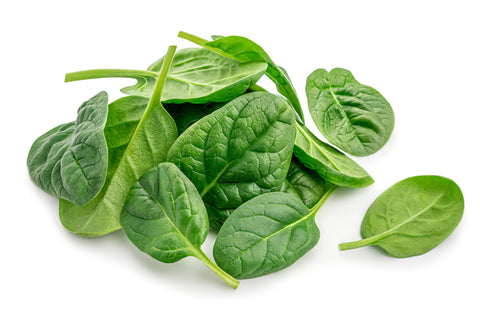Your cart is empty
Free shipping on all US orders


Free shipping on all orders

Spinach is a leafy green vegetable belonging to the Amaranthaceae family. It has been long known and cultivated for its medicinal and nutritive properties and antioxidant abilities. It dates back to ancient Persia where it was used as a cure for many diseases, particularly those related to blood disorders such as anemia.

Spinach is a rich source of vitamins, minerals, and dietary fiber. It is a very good source of manganese, vitamin K, magnesium, phosphorus, zinc, and copper. Spinach also contains good amounts of iron, potassium, calcium, vitamin A and vitamin C.
In addition to this, spinach possesses phytochemicals such as quercetin, beta-carotene, and kaempferol. It also possesses indole-3-carbinol and diindolylmethane, natural aromatase inhibitors that are helpful in reducing the risk of certain estrogen-related cancers.
Cardiovascular Health: Spinach contains antioxidant properties that can help protect blood vessels against damage. It also reduces the amount of bad cholesterol in the body, which reduces your risk for cardiovascular disease.
Skin Care: Due to its anti-inflammatory and antimicrobial effects, spinach is beneficial in preventing eczema, acne, psoriasis, and other inflammatory skin conditions.
Enhanced Brain Function: Spinach provides some protection against neurodegenerative diseases like Alzheimer’s and Parkinson’s due to its antioxidant properties which reduce age-related inflammation in the brain. It also helps improve cognitive function by providing higher concentrations of choline, a B vitamin that is important for brain health.
Stamina: Spinach is rich in iron, which increases hemoglobin levels. Iron deficiency leads to anemia and can cause fatigue, so increasing your intake of this nutrient-rich vegetable will combat the signs of lethargy.
Digestive Health: Spinach contains high amounts of dietary fiber that help promote regularity and digestive health. When combined with water, dietary fiber forms a gel-like substance in the intestines that helps slow down digestion and absorption of sugar. This can help reduce blood sugar spikes after meals and keep energy levels more even throughout the day.